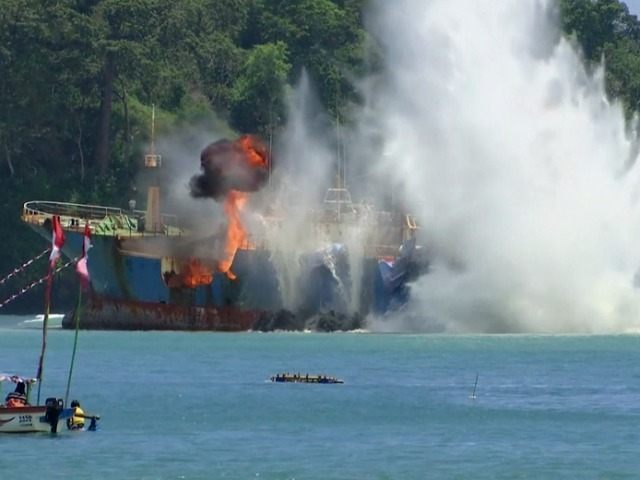Following the arrest of the crew of a Chinese ship allegedly fishing illegally in its waters, the government of Indonesia is facing regional criticism for shooting at two Taiwanese ships that it also alleges had trespassed into Indonesian territory. The recent incidents are helping to raise Indonesia’s profile as a formidable player in growing tensions in the South China Sea.
Indonesian Coast Guard patrol ships fired at two Taiwanese vessels traveling to Singapore this week, both of which had allegedly illegally entered Indonesian waters in the Strait of Malacca. Indonesian authorities let the ships go, but not before firing about 20 shots at them. The Lien I Hsing No. 116 was reportedly fired at about “four or five times;” the Sheng Te Tsai had 12 bullet holes in its hull. Indonesian authorities insist they made multiple attempts to communicate with the ships and did not receive a response, and that their officers followed all legal protocol regarding such trespasses.
Both ships have arrived in Singapore, where their crew spoke to media about the incident.
Captain Lin Nan-yang of the Sheng Te Tsai told Singapore’s The Straits Times his crew was unable to hear any of the messages from Indonesian officials. “At first, we thought we were being attacked by pirates. There was no warning at all and they started shooting. … Everyone was just hiding under the consoles or in their bunks, hoping to stay alive,” he said, adding that, while he tried to contact one of the Indonesian vessels, he “didn’t understand what the other side was saying.”
Taiwan is demanding answers. “We require that the Indonesian government respond speedily to our statement as to why our fishing boats fired on the cockpits of our fishing boats,” the Taiwanese Foreign Ministry said in a statement, summoning an Indonesian diplomat in Taipei to explain the circumstances behind the attack. Indonesia has yet to issue a formal response, other than denying any wrongdoing on the part of their law enforcement officers at sea.
The incident occurred shortly after the government of Indonesia arrested the crew of a Chinese ship illegally fishing in the waters near Natuna Island, one of the few territories in the South China Sea that Beijing acknowledges does not belong to it. Nonetheless, the Chinese government claimed the ship fishing near Natuna had not broken the law because it was operating in “traditional Chinese fishing grounds.”
The Indonesian government disagreed and captured the ship and its crew. The Chinese Coast Guard responded to the event by ramming the captured ship, forcing Indonesian authorities to let it go. Indonesia still has custody of the ship’s crew and has refused to return them to China, asserting they will be prosecuted for their trespass. Indonesian head of maritime security responded to China’s claim that the waters near Natuna are Chinese by describing bilateral relations as “a new ball game” following the remark.
The Indonesian government, while wary of Chinese claims, has also insisted that the fishing incident is “a fishing dispute” and not a defense issue, though legislators are pressing President Joko Widodo to take stronger measures to keep China out of Indonesia’s waters.
The Associated Press notes that Indonesia has destroyed “dozens” of ships for trespassing its waters. The nation has also taken an aggressive stance against China for its expansive claims in the South China Sea. Indonesian officials have specifically threatened to take China to international arbitration over its claims in the South China Sea, though they are one of the few nations whose claims in the sea do not overlap with China’s. China has claimed territory belonging to Taiwan, the Philippines, Vietnam, Malaysia, and Brunei. The Philippines has taken the case to the International Court of Arbitration at The Hague.
China has attempted to use Taiwan’s claims in the South China Sea as proof that the territory belongs to China, as Beijing does not recognize Taiwan’s sovereignty. The Chinese government applauded outgoing Taiwanese President Ma Ying-jeou for traveling to Taiping, the largest island in the Spratly chain claimed by Taiwan in the region, claiming his trip was to promote China’s claim over the island. The United States called the trip “extremely unhelpful.”
Taiwan is now seeking to have the island designated an official island by international law, not simply a “rock” that cannot legally have sovereignty. Also claiming Taiping is the Philippines in the case at The Hague. “Islands are entitled to territorial waters, an exclusive economic zone and other rights not enjoyed by mere rocks,” The Jakarta Post explains. Taiwan argues that, because it runs a hospital and other facilities on Taiping, it is by definition an inhabited island belonging to Taiwan. To promote its claims, Taiwan will also be aiding journalists who wish to see it in trips to Taiping.

COMMENTS
Please let us know if you're having issues with commenting.